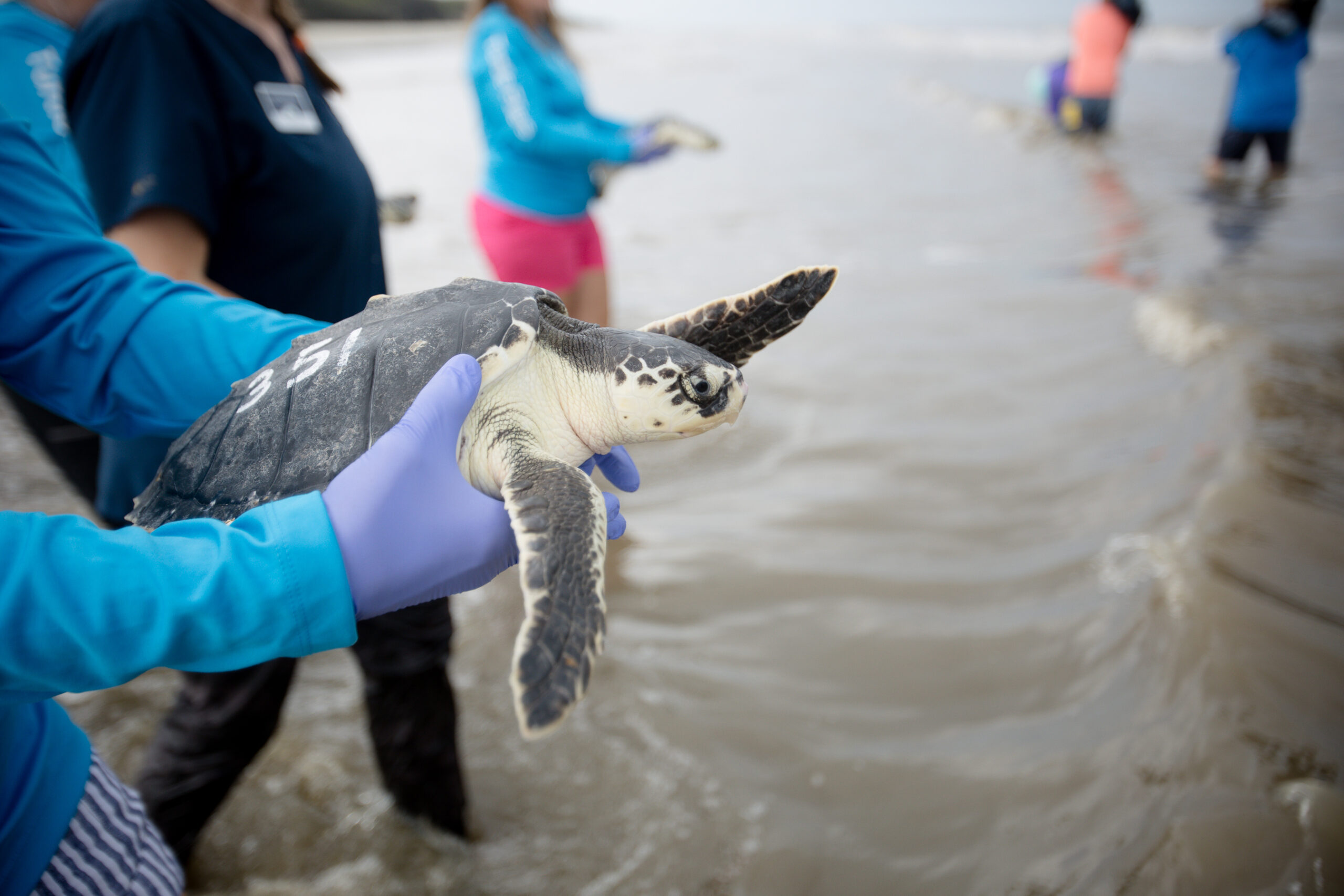Please note: We strongly recommend purchasing tickets online in advance to guarantee entry, as we do sell out on weekends.

JEKYLL ISLAND, GEORGIA (April 4, 2024) – Following months of treatment, 34 rehabilitated sea turtles under care at four facilities on the East Coast are back in the ocean after being released on Jekyll Island in Georgia Wednesday.
**PHOTOS AND VIDEO OF RELEASE EVENT AVAILABLE HERE, COURTESY OF TURTLES FLY TOO**
The turtles spent the past four to five months at the Atlantic Marine Conservation Society, Mystic Aquarium, New England Aquarium, and New York Marine Rescue Center, where they underwent care for hypothermia-related conditions including pneumonia, dehydration, and trauma. More than a dozen staff members from the six agencies assisting with the release on Jekyll Island cheered on the 33 Kemp’s ridley sea turtles and one green sea turtle as they were carried into the warm ocean waters.
The sea turtles spent the last several months under rehabilitation care for cold-stunning, an annual phenomenon that happens in the Northeast when water and air temperatures gradually drop late in the year.
“As the Jekyll Island Authority’s Georgia Sea Turtle Center continues its mission to protect and conserve sea turtles, partnerships are paramount. Through collaborative efforts, we can ensure the successful rehabilitation and return of these magnificent creatures to their natural habitats, safeguarding their future for generations to come,” said Michelle Kaylor, director of the Georgia Sea Turtle Center. “We are honored that Jekyll Island could serve as the host beach location on the Atlantic coast for the release of these rehabilitated sea turtles as they make their way to warmer waters.”
“It was so rewarding to have this group of sea turtles released on Jekyll Island after being nursed back to health by the New England Aquarium and our partner organizations. These turtles that stranded late last year have certainly received wonderful care and are fully recovered as we send them back home,” said Adam Kennedy, director of rescue and rehabilitation at the New England Aquarium. Eleven of the Aquarium’s turtles were released Wednesday, including Kemp’s ridleys “Mulberry” and “Mayflower” and one green sea turtle, “Delphinium.”
Volunteer pilots from the nonprofit organization Turtles Fly Too flew the turtles from Massachusetts and New York, which allowed the animals to quickly reach their destination in Georgia with minimal stress.
“Turtles Fly Too pilots have airlifted thousands of endangered sea turtles in the past decade. Providing this scope of air support for this crucial conservation effort is a great honor. We are proud to work with the private sector in supporting the International Union for Conservation of Nature’s (IUCN) Global Species Action Plan,” said Leslie Weinstein, president of Turtles Fly Too, who was on Jekyll Island for the release event.
Every fall and early winter, hundreds of cold-stunned sea turtles wash up on the beaches of Cape Cod, MA. Because of the rapidly changing water temperature and wind pattern, many turtles cannot escape the hook-like area of Cape Cod Bay before becoming hypothermic. That’s when staff and volunteers with Mass Audubon’s Wellfleet Bay Wildlife Sanctuary come in, patrolling the beaches for stranded turtles and transporting the live animals to the New England Aquarium’s Sea Turtle Hospital and National Marine Life Center for treatment. This past cold-stunning season, nearly 400 live turtles came through the Aquarium’s doors. As their Sea Turtle Hospital filled up, the Aquarium worked closely with the National Oceanic and Atmospheric Administration (NOAA) Fisheries Service and Turtles Fly Too to transport stabilized turtles to partner organizations that could continue the rehabilitation process and free up space for new patients in Massachusetts. Through the help of Turtles Fly Too’s volunteer pilots, some of these cold-stunned sea turtles make the journey all the way to Jekyll Island to the Georgia Sea Turtle Center for rehabilitation care, many of which are currently undergoing treatment at the facility until they are cleared for release.
“We are so thankful for these great partnerships within the network to support getting these turtles back home to the ocean,” said Maxine Montello, executive director of New York Marine Rescue Center, which released five Kemp’s ridley sea turtles—four transferred from the New England Aquarium and one that stranded off New York in 2022.
“This event is a great example of how the sum of working together has a greater impact than working individually. Thank you to Turtles Fly Too and our network partners for their continued support in making these transports possible,” said Robert A. DiGiovanni, Jr., executive director and chief scientist of the Atlantic Marine Conservation Society. The organization rehabilitated 16 of the Kemp’s ridleys released Wednesday.
“The rehabilitation and release of just one critically endangered Kemp’s ridley sea turtle can have a huge impact on the population, and we are grateful to play a part in the critical conservation efforts for this species,” said Sarah Callan, manager of Mystic Aquarium’s Animal Rescue Program, which sent two of the turtles involved in Wednesday’s release event.
All but one of the released turtles were Kemp’s ridleys, a critically endangered species that faces threats including fisheries interactions, climate change, ocean pollution, and degradation of their habitat. Rescue and rehabilitation efforts help to conserve this species.
The New England Aquarium, in partnership with National Aquarium and South Carolina Aquarium, is working with Sen. Ed Markey (D-MA), Sen. John Cornyn (R-TX), Rep. Bill Keating (D-MA-8), and Rep. Jenniffer Gonzalez-Colon (R-PR) to pass the Sea Turtle Rescue Assistance Act. While all six species of sea turtles found in the U.S. are protected under the Endangered Species Act, there is little federal support directly available to organizations engaged in conservation efforts. The bill would help institutions continue to provide the rescue, rehabilitation, and research needed to help these animals.
MEDIA CONTACT: Pam Bechtold Snyder, psnyder@neaq.org; 617-686-5068
